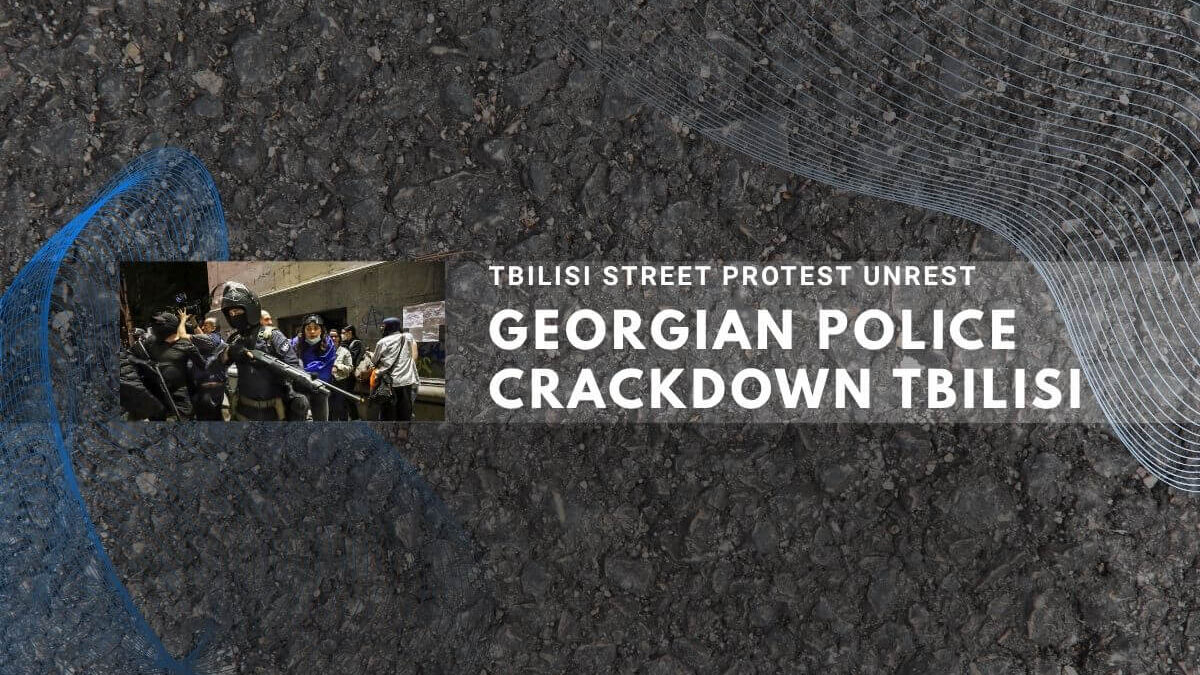Georgian riot police deployed tear gas, water cannons, and pepper spray against protesters in Tbilisi on October 4, 2025, during municipal elections boycotted by major opposition parties [1]. Thousands of demonstrators gathered in Freedom Square and along Rustaveli Avenue, attempting to breach the presidential palace after opposition leaders called for a peaceful revolution against the ruling Georgian Dream party [2]. The clashes resulted in injuries to 21 security personnel and 6 protesters, with 13 individuals initially detained [3].
Police Response to Presidential Palace Breach
Riot police equipped with armor forcefully repelled protesters using pepper spray and water cannons as demonstrators tried to storm the presidential palace gates shortly before polls closed [1]. The Ministry of Internal Affairs declared the demonstration unlawful, stating it had exceeded the norms set by law [2].
Injury Reports and Initial Detentions
Georgia’s health ministry reported specific casualty figures from the confrontations [3]. Law enforcement detained 13 individuals in connection with the disturbances that unfolded throughout the day [3].
Opposition Calls for Peaceful Revolution
Opposition factions urged supporters to participate in what they termed a peaceful revolution against Georgian Dream, which they have labeled as pro-Russian and authoritarian [2]. The largest opposition groups chose to boycott the municipal elections entirely, arguing the ruling party manipulated previous electoral results [3].
Context of European Union Aspirations
The demonstrations occur amid ongoing tensions following Georgian Dream’s suspension of European Union membership discussions last year, derailing a constitutional objective vital to many citizens [2]. Demonstrators waved Georgian and EU flags while displaying signs advocating for EU membership [1]. Since the ruling party’s victory in elections the opposition claims were manipulated, pro-Western opposition groups have organized continuous demonstrations despite widespread arrests and police brutality [3].
Key Details of October Events
The municipal elections and resulting protests unfolded with several significant elements:
Tens of thousands assembled in central Tbilisi on Saturday coinciding with local elections in the nation of 3.7 million [1]
Riot police used tear gas, water cannons, and pepper spray to disperse crowds [1]
Protesters attempted to breach presidential palace fence moments before polls closed [2]
Health ministry reported 21 security personnel and 6 protesters injured [3]
Ministry of Internal Affairs detained 13 individuals initially [3]
Five opposition leaders charged with coup attempt by October 7 [4]
Among those arrested was renowned opera singer Paata Burchuladze [4]
Prime Minister Irakli Kobakhidze warned of further arrests on Sunday [4]
Subsequent Legal Actions Against Opposition
By Monday, October 7, prosecutors brought charges against five opposition leaders, accusing them of attempting to destabilize the government [4]. The allegations carry a potential maximum sentence of nine years in prison for calls to violently change Georgia’s constitutional framework or overthrow state authority [4]. Prime Minister Kobakhidze described the events as an attempted coup, stating no one would escape consequences for violence inflicted on the state and law enforcement agencies [4].
Protester Sophio Asatiani expressed to media outlets that demonstrators are fighting for their rights and independence, hoping to avoid a return to the Soviet period when Georgia was governed from Moscow [2]. The government’s crackdown includes legislation targeting protesters, rights organizations, NGOs, and independent media, with critics arguing some laws mirror those enacted in Russia where President Vladimir Putin has severely suppressed opposition [3].



